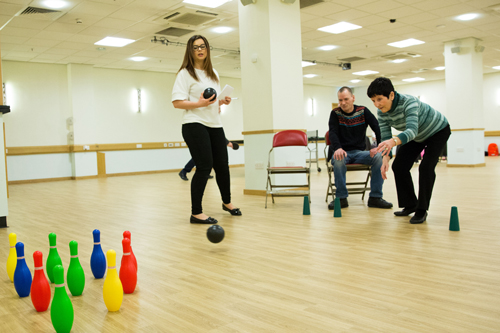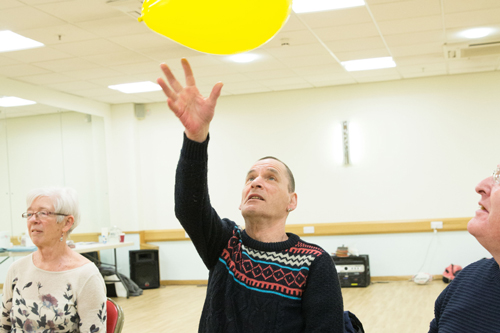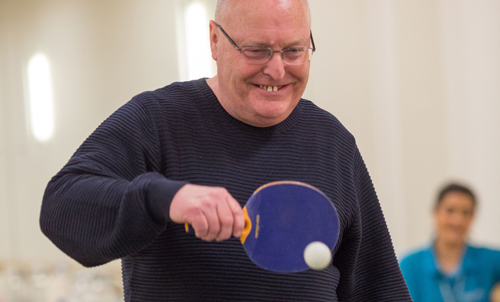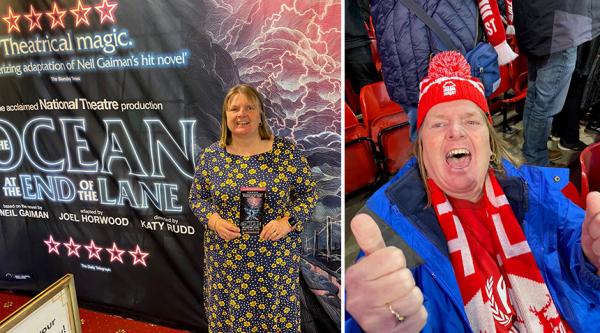Bringing younger men with dementia together to enjoy physical activities
From the April/May 2016 issue of our magazine, a new service focuses on bringing younger men with dementia together for physical activities. Julie Penfold attends a session to see how the pilot is going.

Many younger men who are diagnosed with dementia find it particularly hard to continue getting out and about to enjoy their favourite activities.
Alzheimer’s Society is piloting a new service called Games for the Brain in Newcastle, North Tyneside and County Durham until January 2017. This provides weekly indoor sporting activities as well as invaluable time to socialise with people in a similar situation.
Hannah Woodworth, Dementia Support Worker, says,
‘Games for the Brain sessions aim to improve cognition, increase feelings of wellbeing and reduce feelings of isolation and loneliness for younger men with dementia.
‘This group keeps people active and helps them to become independent in the community again. People get an enormous amount of enjoyment from the sessions.’
Active together
One Games for the Brain group takes place every Friday afternoon at Newcastle’s Eldon Leisure Centre, a city centre location chosen for its easy access via public transport.
Sessions begin with a 10-minute seated warm-up that everyone participates in, including carers, volunteers and staff. This involves arm and leg movements to get everyone ready for the activities ahead, and background music comes from CDs brought along by group members.
Following the warm-up, there is a range of fun games to help with balance, grasp and focus, such as balloon tennis. One of the group’s main activities is table tennis – which research suggests could be especially beneficial for people with dementia to help maintain co-ordination and awareness – and other popular choices include ten-pin bowling.

Joining in
Volunteers are on hand to join in the games and to help with scoring if needed. Margaret George is a volunteer who has her own experience of being a carer.
She says,
‘My husband had dementia and there was no specific support for him. He would have loved this. I’m proud to be involved.’
Towards the end of the session, the group has a fruit and water break and this gives everyone the chance to sit down and have a chat with one another.
Hannah says,
‘It’s a very supportive group. Getting into the city centre to attend the sessions is a big deal for some of the members, and conversations might start with how someone got into Newcastle and whether they got the bus or the metro.
‘They can also provide help to one another if there is something someone is struggling with, for example, how to go about getting a bus pass.’
Although the group largely attracts men under the age of 65, active men over 65 also attend, and some carers take part as well.
Anne McGuire attends sessions with her husband, John. For some time she was the only carer at the group, but others have begun to attend and this provides vital peer support for Anne.
She says,
‘Games for the Brain is 100 per cent beneficial for both of us. It gets us out of the house and doing different activities.’
- Find dementia services near you using our online directory, Dementia Connect.

Confident and independent
The weekly sessions have helped group members to gain confidence and become more independent – to say nothing of the improvement in their table tennis skills!
The service has been especially invaluable for one member. Brian Wood has begun to use public transport to travel to sessions independently. He has also made friends within the group, and Games for the Brain provides his week with some much needed routine.
Brian says,
‘When you’re on your own and living alone, it’s really nice to get a phone call from someone in the group.
‘It stops the loneliness coming in. People are friendly, helpful and considerate. Anne gives me a ring each week to remind me that the session is on.
‘Games for the Brain is such a good support. It’s a chance to catch up with friends, and I know there are people waiting for me so I can’t let them down.
‘It feels like a family and we have a real rapport as a group.’
After a dementia diagnosis, it’s important to keep up the activities and interests that you enjoy, advises Hannah.
‘Joining a group who have similar interests can help to reduce feelings of isolation and low mood.
‘It can also provide a relaxed setting for people in a similar situation to be able to support each other.’








